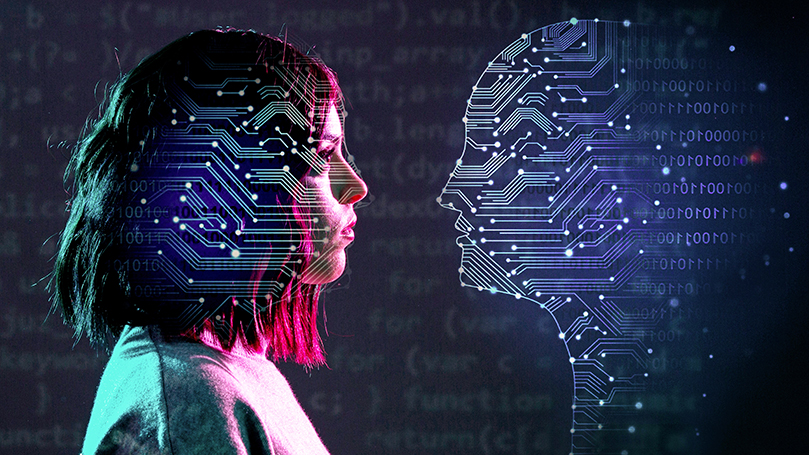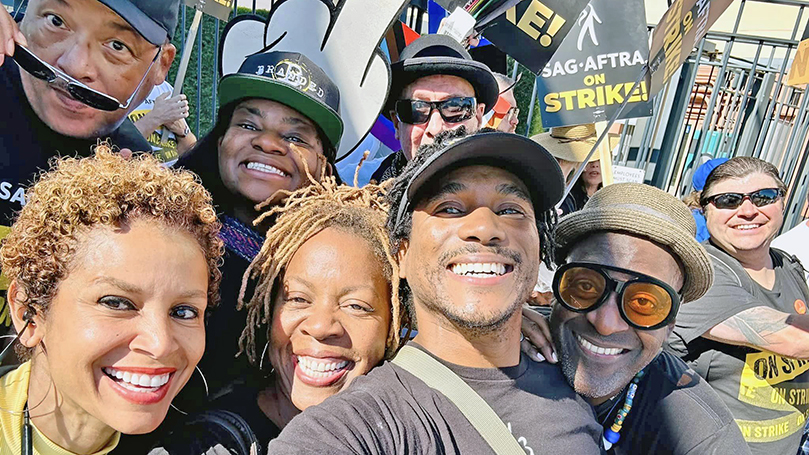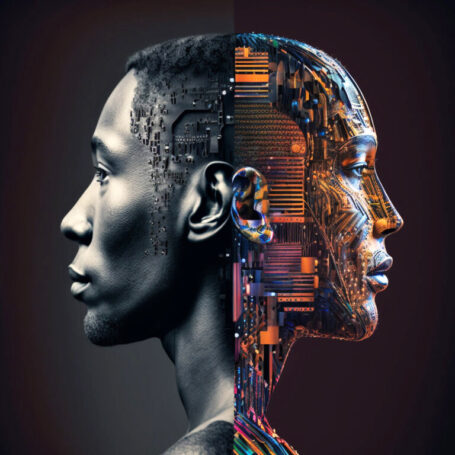
There is a lot to talk about on the subject of Artificial Intelligence (AI). But let’s cut to the conclusion first, in case the forest of diverse dimensions of this fairly deep topic gives you a headache!
Liz Shuler, President of the AFL-CIO, hit the nail on the proverbial head when asked what to do about Artificial Intelligence.
She said, for a start, “Strengthen collective bargaining rights, like, generally,” according to a recent Politico Interview.
This may sound like an ‘automatic’ response from a union, but in fact it reflects and sums up serious and energetic work by the AFL-CIO leadership to engage the impact of AI on U.S. workers.
Sister Shuler goes further:
“Through every industrial revolution, labor has been the force that has harnessed the technology and channeled it in a way that’s productive and safe. … We need to be that stabilizing force, and we are the only movement that can do that.”
That’s a bold claim. But, I submit, it’s true.
Let’s review some key events from the past year that demonstrate AI is a general purpose technology — meaning it will invade and transform every sector of the economy, whether service or manufacturing. And the economy is just a starting point for analyzing the cumulative effects: the place where the AI tech winners and losers can be measured in wealth, poverty, jobs, and economic security for families. These economic factors can only begin to address the broader political, cultural, war and peace dimensions of AI’s impact on workers’ lives and the society as a whole.
The labor movement has always had a moral focus on “leaving no one behind” in industrial policy. Thus, the AFL-CIO’s participation by invitation in the presidential Select Committee on AI is focused on regulations and investments related to training workers for jobs in the event of displacement.
Experience, just in the past year, highlights the serious threats of displacement, excessive surveillance, and safety concerns in increasingly automated workplaces. Here are some examples:
- The SAG-AFTRA strike directly challenged the lack of compensation to cultural workers, like actors and writers. Millions of dollars worth of materials created by these workers is deployed and possessed by the big tech platforms without any compensation.
- The Kentucky legislature, among others, authorized the purchase of driverless school buses because the state government won’t pay enough to attract a sufficient number of licensed drivers for buses.
- Stanford University studies testing AI chatbots against U.S. high school and college graduates in a wide range of subjects and trade skills showed the chatbots competitive with or superior to humans at over 60% of tasks and problems. Chatbot technology is still at an early stage.
Chatbots are already being used extensively by Human Resources departments to screen applicants for jobs. - AI is being extensively used for surveillance of workforces, infamously in Amazon, for example.
AI image and identity fakery is already very robust on social media platforms. The recent global abuse of Taylor Swift, for example, was only halted by the fact that she had plenty of lawyers to get the attention of the platforms. - Seven corporations — all dominant in emerging AI technology — now constitute 30% of the wealth of the Standard and Poors 500 stock index, which is the 500 largest corporations in the U.S. that are traded on Wall Street). Already, there is strong evidence that, unless President Shuler’s advice is heeded, inequality will not slow down, nor reverse. Instead, inequality will accelerate as the concentration of wealth increases.
- Every advance in technology has spawned even more rapid and pervasive advances on top of it. These advances obliterate many occupations, even very skilled ones, each of which might consume an entire working life! (There were still 300,000 buggy workers in 1904, the year the Model T was built). Most jobs are now “gigs”, with virtually no protections against abuse, wage theft, or unsafe and unhealthful working conditions. The globalization frenzy from the ’70s onward has shown that without care for those left behind, without early retirement or retraining, without a means to redress grievances, and other support, the rapid pace will continue ripping society apart. has proved this. The consequences have been a seriously divided society and an active fascist movement challenging all the better presumptions, hopes, and expectations of U.S. democracy.
- The giant tech platforms may not “own,” but they certainly possess data-rich information on billions of users around the world. This information is global, and as valuable and detailed, if not more so, than any possessed by the governments of the world, including the United States. As any lawyer knows, possession is 9/10 of law.
- UPIU President Mary Kay Henry found that retraining was being offered to some California home healthcare workers facing likely replacement by online and other automated services. However, retraining programs don’t accommodate themselves to the workers’ schedules, which often cannot be predicted with enough accuracy from week to week, or even day-to-day, due to the way healthcare companies schedule.
- The role of robots, self-driving vehicles, electric vehicles, and other potentially “green” technologies became a key persistent issue in the 2023 national Teamster mobilization at UPS, and for the auto workers in union struggles against the “Big Three” automakers. Strikes, or effective strike threats, were required to get these issues on the bargaining table at all.
- The leadership drama at OpenAI.org has smashed any aspirations of idealistic developers who imagined they could take nearly 30 billion dollars in investment from the likes of Microsoft and Elon Musk, and then deny the mega-capitalists access and control over AI technology. It did not take long for Bill Gates to resolve it in Microsoft’s favor, including recruiting (or possibly directing) former Treasury Secretary Larry Summers (and a leading U.S. bourgeois intellectual) to its board of directors to supervise both economic and policy issues.
In addition to a major expansion of collective bargaining rights, President Shuler also advocates for establishing a national “traffic cop” entity for evaluating new technologies. The entity would function similarly to the FDA (Food and Drug Administration) to make sure new products don’t kill people before they are released to the world. A people’s movement must be built to demand federal action and regulation around this initiative.

Legal battles In bourgeois courts
While the need for action and regulation is clear, the exact role of the “traffic cop” is not clear at all. Most of the “action,” so far, has been in the courts, where the issue is “intellectual property rights.” Daily, even hourly, millions of people post or share digital content on social media platforms that arguably violate some interpretation of what constitutes “property” in ideas, or other “intangible” products.
It is the “intangibility” that causes a serious problem for “ideas” in the commercial, capitalist world. The famous economist Paul Samuelson once called ideas “crappy commodities” on two grounds: 1) it is very difficult to reduce the origin of any idea to a single person, especially in modern, highly socialized and collaborative institutions and environments. For example, up to 99% of patented pharmaceutical products consist of knowledge in the public domain. 2) Intangibles do not retain value like tangibles — a hammer, for example. And, they are copied, i.e. ‘stolen,’ and reproduced with relative ease.
Despite these impediments, capitalism has little means other than “property” to protect or express commercial values. Thus, an immense legal edifice of patent and copyright laws and trade protection has evolved over the years. But the inherent contradictions of forcing ideas into fixed or rigid property molds is sending a wrecking ball into much of this edifice. There are many lawsuits working their way through the courts demanding that the major platforms pay compensation for violations of intellectual property rights or privacy rights.
These lawsuits may or may not prevail. The AI engines or algorithms require truly immense data oceans to train and perfect AI models. If you think of the key role of oil in the industrial age, you have the key to thinking about data in the AI or cloud computing age. Only the current big platforms have the “oil” to deliver the anticipated performance. The lawsuits, and reform movements rising will need big (i.e. tax-the-rich-generated) resources to handle the enormous costs of AI transformations, and just transitions — way beyond the past, largely empty, talk. Getting money from the big tech companies will be a necessity. However, it is highly unlikely that they will be denied access to the data that people “willingly” shared on their platform.
Further — without going into too many theoretical or technical details — the “crappy,” “leaky” attributes of intangible commodities, combined with the scale of data requirements, have contributed to a very rapid rise of monopoly firms in the AI industry. Operating within the basic laws of capitalist accumulation, the intangibility and scale of data requirements, and the AI tech companies profiting from them, act to counter and considerably weaken existing antitrust remedies to market concentration. If data “clouds” (i.e. groups of servers running software and databases that are accessed over the Internet) get smaller or fragmented, a competing company with a larger, less fragmented cloud gains a computational edge.
The best remedy providing scale, economic justice, and international working-class unity (and the only real solution, in the long-term), is socialism. No more deadly adversaries — at least in near-earth spaces!
The political side
 One might not buy that yet. So, let’s look at the political side of AI. In an important sense, AI is a reflection of our global, collective intelligence. Its powers of classification, simulation, prediction, noise reduction,computation, and other learning techniques appear to mimic our own learning processes. Only now, they are operating under the power of the owners of the cloud platforms.
One might not buy that yet. So, let’s look at the political side of AI. In an important sense, AI is a reflection of our global, collective intelligence. Its powers of classification, simulation, prediction, noise reduction,computation, and other learning techniques appear to mimic our own learning processes. Only now, they are operating under the power of the owners of the cloud platforms.
Facebook, for example, possesses billions of rich personal profiles. Included in such profiles are marketing preferences which serve the original advertising business models of Meta, Google, and Amazon, of course. But they also include detailed social and political profiles that are gold mines to anyone with a significant political interest, such as the billionaire owners of the “Magnificent Seven” AI corporations (i.e. Apple, Microsoft, Amazon, Nvidia, Meta, Tesla, and Google’s parent company Alphabet). Even with our great powers of imagination, we are likely to underestimate their ambitions and influential reach.
Economic consequences are important, urgent, and immediate. However, the political dimension to the AI story is no less profound.
President Biden, by executive order, recently granted U.S. national security agencies direct access to any “foreign or terrorist” sources or transactions accessing U.S.-based cloud computing resources — where Microsoft’s advanced AI computing capabilities are mostly concentrated, for example.
One does not have to be paranoid to be alarmed about news of this intrusive state surveillance. It will thus be a key task of a socialist movement and government to establish democratic dominion over AI, indeed over development policies in general.
The politics of AI can be summarized thus:
It is disruptive. This has both an upside and a downside. On the one hand, it promises immense improvements in productivity. An AI-assisted healthcare worker may be able to effectively and accurately treat 10 times as many patients as before. Perhaps more.
Disease detection and remediation are being revolutionized. Manufacturing will become even more automated. With that, the real costs of commodities should fall, as should the rate of profit (though not necessarily the absolute mass of profit) on productive capital. Many services and skills will be replaced with new tools. With increases in productivity, work time can be dramatically reduced and wages increased.
AI-assisted education (including for the AI itself!) is already delivering high-level engineering, language, and other skills. One AI activity, centered around Stanford University, provides AI-assisted education to millions. I took the course myself for $50.
These few examples are just the tip of the spear. In many industries, AI promises to enable the direct collaboration of any worker, anywhere in the world, with any other worker, anywhere in the world.

The domination of media and politics by the billionaire, Wall Street, and military-industrial complex is vastly increased by AI. Like their domination of the S&P 500 stock index, the domination over the media by these “Magnificent Seven” leave very little room for influence byr the rest of us.
Privacy and sovereignty
Even under the most favorable outcomes, it is fair to ask: What privacy remains, either from corporate, state, or even not-so-hypothetical “independent” AI entities? The answer is, not much.
I believe some of the inferences are clear. Whether or not privacy is being reduced may be difficult to answer. It currently varies greatly by one’s economic class. But it is definitely being redefined in generational practice, as are many if not most family and other forms of friendship, association, and community.
At the same time, democratic global governance must advance, if the weaponization of AI is to be averted. The connectedness of global populations will increase. The interactions of global AI entities with the work of all peoples undermine many border lines.
It is the work of the world that changes the world, every day.
Which takes us back to the beginning with President Shuler and her call for expanding collective bargaining as the chief path available to working-class folks to defend themselves against disruptive technologies — historically, and now. If we do not separate these powerful technologies from billionaire control, it’s likely to be one billionaire dictatorship threat after another unto the horizon, until we do.
The political reforms required to bring AI under democratic dominion seem a revolution away. But solidarity movements from the past year have been warming the blood of the labor movement. Asserting the principle of “leave no one behind” with every bit of force we can muster, is a match that, struck with good timing, can start a political prairie fire. Something AI is not yet trained to handle.
Images: Master Artificial intelligence and visual computing by Ecole polytechnique (CC BY-SA 2.0 Deed); Machine Learning by hackmau5 (CC BY-NC-ND 3.0 Deed); How will generative AI revolutionize our work by Axelara (Creative Commons); Artificial Intelligence Phoenix Bird by GoodFon (Creative Commons)


 Join Now
Join Now